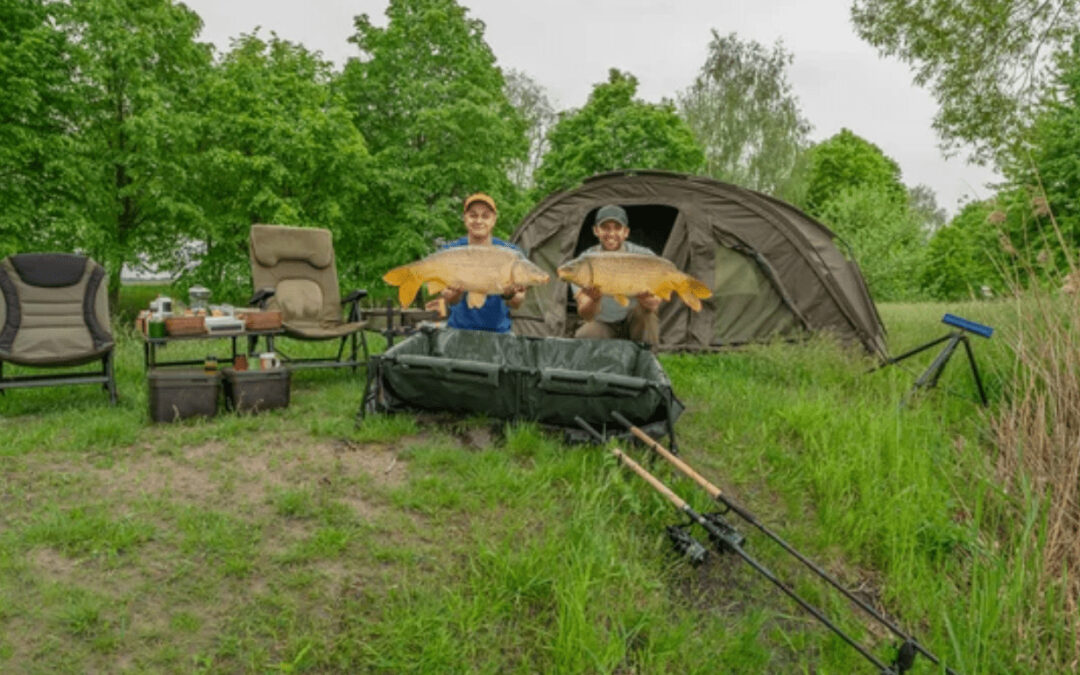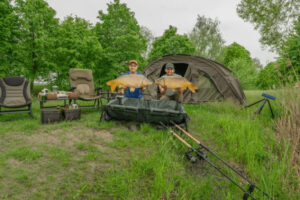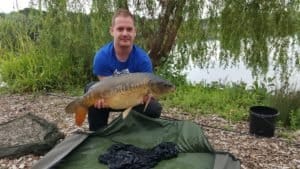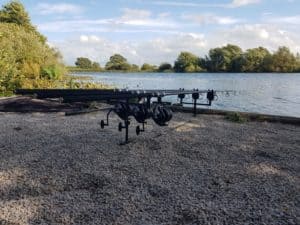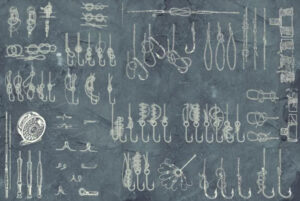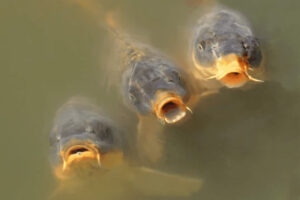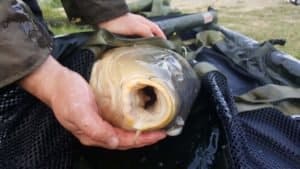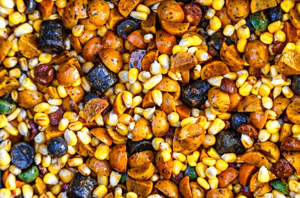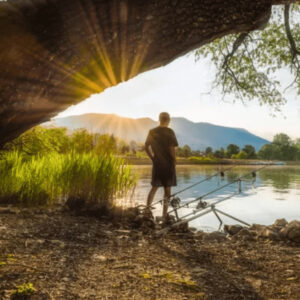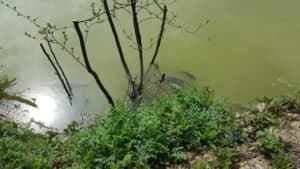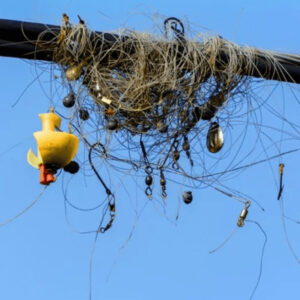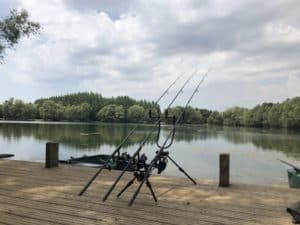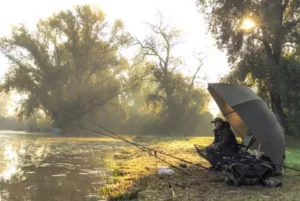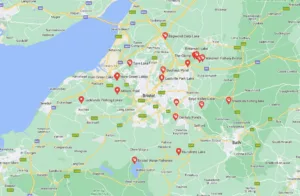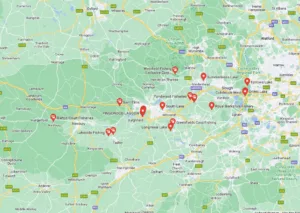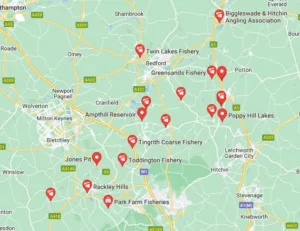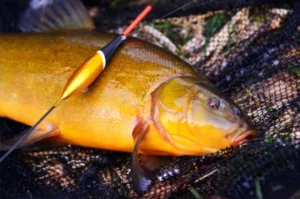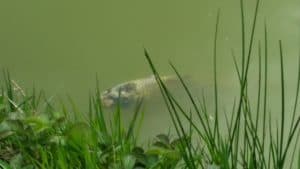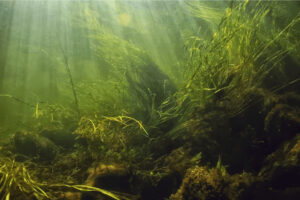Every carp angler knows that it’s important to keep your gear clean and decontaminated after a carp fishing trip.
This is especially important if you plan on using the same gear in multiple bodies of water.
In this blog post, we’ll discuss the best methods for decontaminating your fishing gear and the importance of doing so. Let’s get started!
Reasons for Decontaminating Fishing Gear
Carp fishing can be a thrilling and rewarding experience, but it is important to remember to decontaminate your gear before and after going carp fishing.
By doing this you’re helping prevent the spread of invasive diseases that can disrupt and damage the delicate ecosystem.
One of the best ways to ensure adequate decontamination is getting rid of all visible carp slime from your equipment and keeping it out of local waterways.
This simple step is an easy way to help keep our aquatic ecosystems healthy!
ALWAYS use dips nets before fishing any lake.
Carp fishing is an enjoyable activity but it can have a negative impact if we don’t take precautions to protect our local environment.
To help prevent the spread of diseases or parasites from one body of water to another, always be sure to decontaminate your gear every time you move from one spot to the next.
This will help remove any fishy smell and reduce the chance of damaging native species.
It only takes a few minutes and helps preserve the health of native fish populations!
Next, it is important to disinfect all carp fishing equipment after each use to reduce the spread of contaminants and maintain water quality in our waterways.
This includes properly cleaning and sanitizing anything that has touched the water, such as nets, waders, boots, or any other gear used for carp fishing.
Properly disinfecting your equipment is key for keeping waterways free from pollutants.
Tips for Decontaminating Fishing Gear
After you’ve spent the day fishing for carp, make sure to rinse off all your gear in clean water.
This helps remove smelly bait or any fishy odors that may have been transferred from the fish to your tackle and keep it in great condition for the next time you go out!
Carp fishing is an exciting and rewarding experience. However, it is important to properly care for your gear after a day on the lake.
Make sure you dry off all of your equipment before packing it up; this will help prevent the growth of damaging bacteria or mildew which could affect the lifespan of your carp fishing gear.
Meanwhile, it is important to be aware of the potential for spreading carp diseases from one body of water to another.
To reduce the chances of carp infections, make sure to disinfect your tackle and rods when necessary, as this can help to remove any traces that produce and prevent further spread.
Taking these steps can help preserve the natural balance in nearby waters and provide a better environment for both fishing and wildlife.
Disinfecting Rods and Reels
Carp fishing is heaps of fun and a great way to spend the day out on the water, however, it’s very important that you take good care of your gear!
To ensure your rods and reels stay in top condition, it’s recommended that you regularly clean and disinfect them.
Fishing gear cleaning solutions are easily available, specifically formulated for this purpose so make sure to grab some for yourself!
If you’re an avid carp fisherman, then you know that your reel needs to be properly maintained or else risk poor performance and corrosion.
A key component of caring for a reel is oiling it regularly.
This helps keep your reel running smoothly and protects it from rusting due to carp slime and other elements.
Make sure to check the manufacturer’s guidelines on how to properly oil your reel, which will help ensure top-quality performance when casting into carp-packed waters!
Moreover, it’s important to be mindful of what comes in contact with your carp fishing equipment.
Carp are known for leaving droplets of slime on the line and rods that can build up over time, leading to corrosion and other issues.
After every use, make sure to rinse off the rods and reels with fresh water to remove any dirt or debris that may have gotten on the equipment, as well as any pesky carp slime.
Cleaning & Rinsing Nets and Buckets
After a full day of carp fishing, it is important to remember a few things before heading home.
It’s essential to disinfect your nets and buckets with an appropriate cleaning solution in order to prevent the spread of any diseases or parasites that may have been introduced during fishing.
Rinsing them off thoroughly will also help keep all of your gear in good condition for future trips!
Carp fishing can be a very enjoyable sport, but cleaning and rinsing your equipment afterward is just as important.
This will help keep the river or lake clean and safe for other anglers and prevent any unpleasant odors from arising.
Disinfecting your gear between trips is also recommended to prevent any unwanted diseases that may have been picked up in the water.
Taking care of your fishing supplies will ensure a positive experience for everyone who shares the waters!
Meanwhile, it is imperative to remember that carp fishing requires thorough cleaning and drying of all equipment after each use in order to prevent the growth of mildew or mold.
Doing so will help ensure the longevity and quality of your equipment so you can enjoy some rewarding carp fishing for years to come.
Sanitising Waders and Other Clothing Items
Carp fishing is a great way to spend a day outdoors.
However, it’s important to remember that carp slime is full of bacteria and other organisms, so make sure you sanitise your waders and any other clothing you wore on your trip after each use.
Not only will this keep you healthy and safe, but it will also help extend the life of your gear.
Fishing for carp is an amazing experience, but it’s important to make sure you take proper care of your waders after each trip.
As well as rinsing them in hot water and hanging them out to dry in a well-ventilated area to remove any dirt or debris, can also help to manage that fishy smell!
Taking good care of your waders will ensure they last longer and keep you comfortable on the next fishing excursion.
Besides ensuring thorough sanitizing, there are a few other things you can do to deal with the dreaded fishy smell after carp fishing.
The first is to air out your clothes and tackle as soon as possible so the smell doesn’t have time to settle.
You can also try washing your clothes with normal detergent and then treating them with a disinfectant cleaner.
Finally, make sure you regularly clean and store away your gear in order to avoid any more unpleasant fishy smells when the next season arrives!
Wrapping up
In conclusion, decontaminating your fishing gear is an essential habit for any carp angler.
Not only does it prevent the spread of invasive species, but it also ensures that your gear performs at its best for each and every trip.
With the tips outlined above, you should have no trouble keeping your fishing gear clean, decontaminated, and ready to go.
FAQ
What steps should you take to properly decontaminate your fishing gear after a carp trip?
You should rinse off the rods and reels with fresh water to remove any dirt, debris, or carp slime. You should also disinfect your nets and buckets with an appropriate cleaning solution, as well as sanitise your waders and other clothing items with hot water and a disinfectant cleaner. Finally, make sure you air out your clothes and tackle as soon as possible and store away your gear in a dry place.
How can I get rid of the fishy smell from carp fishing?
The best way to get rid of the fishy smell is to air out your clothes and tackle as soon as possible so the smell doesn’t have time to settle. You can also try washing your clothes with normal detergent and then treating them with a disinfectant cleaner. Finally, make sure you regularly clean and store away your gear in order to avoid any more unpleasant fishy smells when the next season arrives!
Why is it important to properly decontaminate your fishing gear?
It is important to properly decontaminate your fishing gear because it prevents the spread of invasive species, as well as reducing the risk of transmitting water-borne diseases that may have been picked up in the water. It also ensures that your gear performs at its best for each and every trip, making carp fishing more enjoyable!
What is the best way to store fishing gear?
The best way to store your fishing gear is in a dry place away from direct sunlight. This helps to prevent mould and mildew growth, as well as reduce the risk of any smells or odours settling into the fabric or material. Make sure you regularly check for signs of wear and tear and look for ways to keep your gear in good condition.
What types of cleaning materials and techniques should be used?
When it comes to cleaning your fishing gear, you should use a combination of hot water and a disinfectant cleaner. You can also try using a mild soap or dishwashing liquid if needed. Make sure you thoroughly rinse off your rods and reels with fresh water to remove any dirt, debris, or carp slime. And remember to air out your clothes and tackle as soon as possible so the smell doesn’t have time to settle. Overall, proper decontamination of your fishing gear is an essential part of carp fishing. Whether you’re a beginner or a pro angler, make sure you take the necessary steps to ensure your gear is clean and safe for each trip!
Are there any specific safety precautions to take when decontaminating fishing gear?
Yes, there are a few safety precautions to keep in mind when decontaminating your fishing gear. First, make sure you wear gloves and properly rinse off any cleaning agents used on your equipment. Also, be mindful of the type of detergent or disinfectant you choose to use – some products may be unsuitable for certain materials or fabrics. Finally, keep an eye out for signs of corrosion or wear and tear on your gear – this could indicate a problem that needs to be addressed. Taking these safety precautions will help ensure that your fishing gear is safe and ready for the next carp trip!
Is special cleaning required for any particular types of fishing gear?
Yes, special cleaning is required for certain types of fishing gear. For example, waders should be cleaned with hot water and disinfectant solution in order to reduce the risk of bacteria or fungi growth. Also, reels and rods should be rinsed off with fresh water after every use to remove any dirt or debris that may have been picked up in the water. Finally, make sure you air out and store away your clothes and tackle as soon as possible so the smell doesn’t have time to settle. Taking the time to properly clean and maintain your fishing gear is an essential part of carp fishing!
How often should you consider decontaminating fishing gear?
Depending on how often you’re out fishing, it’s recommended to clean and decontaminate your gear at least once every six weeks. This will help ensure that bacteria or fungi don’t have a chance to build up on your equipment, as well as reduce the risk of any foul odours settling in.
Are there any special storage or transportation considerations for decontaminating fishing gear?
Yes, there are a few special considerations to keep in mind when it comes to storing and transporting decontaminated fishing gear. First, make sure you store your equipment in a dry place away from direct sunlight. This will help prevent mould or mildew growth. Also, if you’re travelling with your gear, be sure to double-bag it so that the smell doesn’t have a chance to spread. Finally, make sure your gear is properly sealed and secure while in transit – this will help prevent any dirt, debris, or carp slime from getting on it. With these tips in mind, you should be able to enjoy a cleaner and safer fishing experience!
Related Posts
I have made a lot of mistakes during my fishing sessions and don’t want you to make the same mistakes. I’ve learned the hard way over 20 years of fishing most weekends, testing, tweaking, and testing again and now want to help you excel with your carp fishing.
If you need any help, you can reach me at Fishing Again’s Facebook page
Last Updated on February 4, 2024 by Shane

